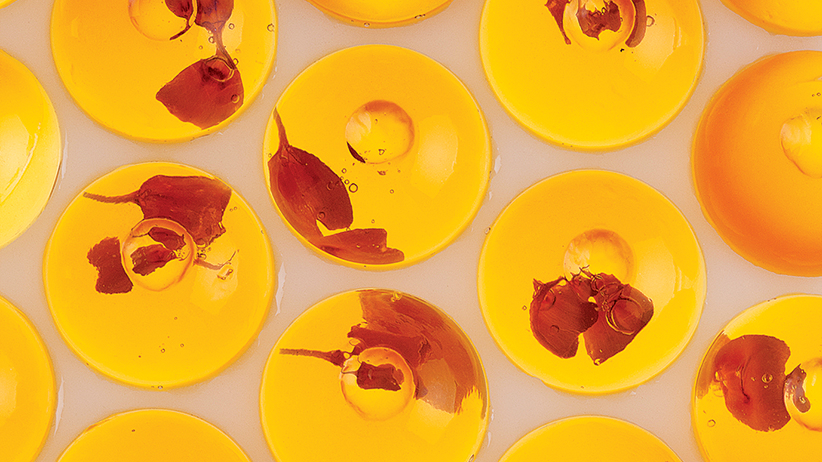The $725 Ferran Adrià book launch
Lessons from the world-famous chef and his cookbook for very rich tastes
Francesc Guillamet/Phaidon Press
Share

Ferran Adrià isn’t having a much luck getting something to eat. The culinary iconoclast sits at a table signing copies of elBulli 2005-2011, his new seven-volume record of the final years of his renowned restaurant, at a “VIP reception” being held in a small ante room to the Glen Gould theatre in Toronto’s CBC headquarters earlier this week. He tries to flag a server passing by with a platter of burnt-rice cubes topped with salmon roe, then has greater success just pouncing on a tray of spoons filled with broccoli, cheddar and kimchee before returning to the line awaiting his signature and a photo with him.
And that’s an honour for which the crowd of 40—dotted with local chefs, journalists and food bloggers busy gossiping about a rumoured second VIP party—have paid $725, a sum that buys the $625 plexiglass-encased volumes and a $35 ticket to Adrià’s sold-out public lecture later, hosted by Indigo. Most of all, it provides proximity to the man known for reinventing gastronomy with his rose-petal tempura, his “vanishing ravioli,” his “liquid olives.” In the flesh, Adrià is the antithesis of the celebrity chef; he’s a gracious, affable man in a rumpled grey jacket, black T-shirt and black jeans who is aided by a translator. The one English word he has down is apt: “Pleasure,” he says upon meeting.
The chefs in the room, busy quaffing Canadian bubbly and canapés from Momofuku Shōtō, are wowed to be in his presence, as they angle for a photo. Cory Vitiello, the chef-owner of The Harbord Room names Adrià as an inspiration. “He’s entirely unique,” he says. Everyone in the crowd knows the elBulli story: how Adrià, who began as a line cook at the 50-seat restaurant in the small town of Roses in Spain’s Costa Brava region in 1981, transformed it into a Michelin three-star laboratory credited with inventing “molecular gastronomy,” a term Adria rejects, preferring “cocina de vanguardia.” They know having eaten at elBulli before it closed in 2011 is a badge of culinary cred. And they know calling Adrià a chef is like calling Leonardo da Vinci a painter: it ignores his role as scientist, inventor, anarchist, trailblazer and artist. Adrià was a Dadaist with a desiccator, the pioneer of now-ubiquitous “foams,” and a master of culinary oxymorons like barbecued sorbet and carrot air.
If the sell-out crowds for Adrià’s five-city North American tour are any indication, there’s also big demand for Ferran Adrià air. James Whittaker, vice-president of sales at Phaidon Press speaks of audience members charging the stage after Adrià’s lectures, hoping to take home the scribbles he uses to illustrate talks. No surprise. The chef’s exquisite renderings of his process during the elBulli years are about to go on a gallery tour. His new book has sold more than 3,500 copies, despite the price, and is about to go into its second printing. Will people go home and whip up “chocolate air-LYO with crisp raspberry sorbet and eucalyptus water ice?” Unlikely. But the rarefied-status cookbook market, which includes Nathan Myrvold’s $600 Modernist Cuisine, isn’t about cooking; it’s about owning knowledge.
Adrià’s 2,720-page, 40-pound reference, filled with stunning photos, 700 recipes and details of elBulli’s creative evolution, is not the final chapter of elBulli but rather a foundational record, as Adrià makes clear in a lecture as mind-expanding as any of his dishes. He calls his next venture more challenging than elBulli: he is cataloguing his restaurant’s evolution as part of a larger culinary taxonomy, a topic on which there’s a shocking vacuum. The project, funded by Adrià’s private foundation, will include a research centre and museum in elBulli’s original location, called Bulli 1846, a name inspired by French chef Georges Auguste Escoffier’s year of birth and the number of dishes created at elBulli. The centre will feature a restaurant open 20 days a year. Adrià is also launching Bullipedia, an online open-platform expected to become a definitive resource.
Adrià approaches cuisine like a Socratic philosopher. “When was the first mousse made?” he asks the crowd, to stony silence. “And you call yourselves restaurant people?” he jokes. He takes nothing as a given: “What is cooking?” he asks. “Is salmon a meat? Is avocado a vegetable?” If you think well, you cook well, he says. Adrià even elevates prosaic questions from the crowd. To “What is your favourite food texture?” he answers: “Anything unique,” mentioning caviar. But cooking isn’t a subjective process, he adds: “Even if I’m Ferran Adrià, my taste is not more important than yours.” Asked what he’d tell a chef starting out, he says “patience,” lamenting that chefs want quick celebrity. “I’m not here for ego or money, but because I want the next generation to be better.” And that is why the chef with no equal is on the road: to alert an audience of the world’s emerging history of cuisine, in which his place is already assured.
Ten Lessons in Creativity from Ferran Adrià
1. Take time off to recharge: “Working, working, working, there is no time to create.”
2. “There can be no proper analysis without the proper tools.”
3. “If you don’t understand what has gone before you can’t know if you are being creative.”
4. “Don’t look for success, look for happiness.”
6.”The reason universities don’t care about [the history of] cooking is because historians and anthropologists don’t have any dialogue with chefs.”
6. “If you don’t look for challenges, you’re dead.”
7. Don’t be daunted by challenge: “If something is easy, it already would have been done.”
8. “You have to ask the question, even if it sounds dumb.”
9. “The diner is as important [to the cooking process] as the the chef cooking it.”
10. “If you think well, you cook well.”